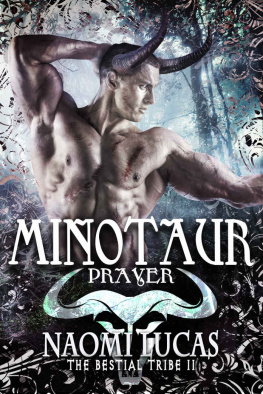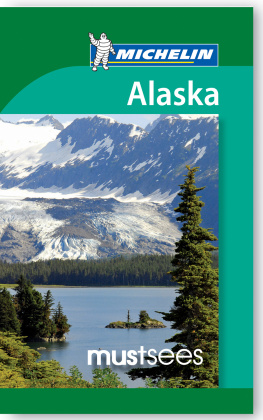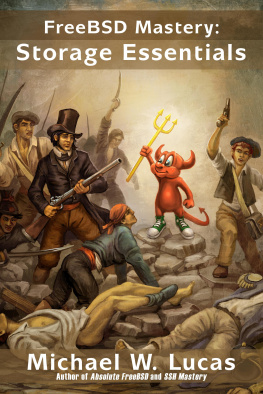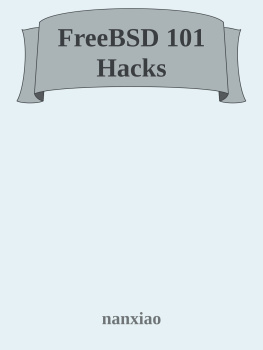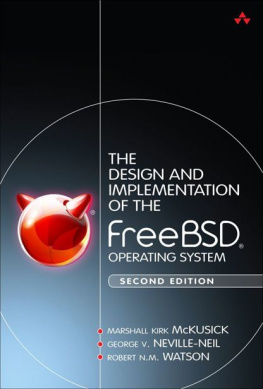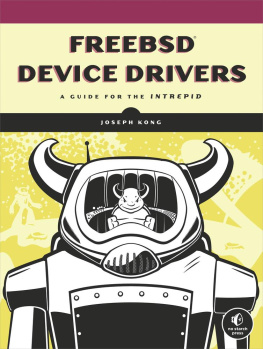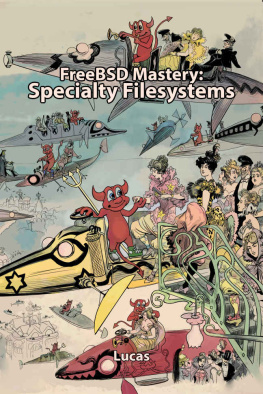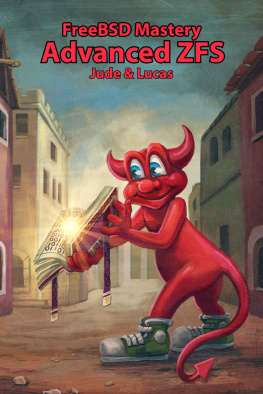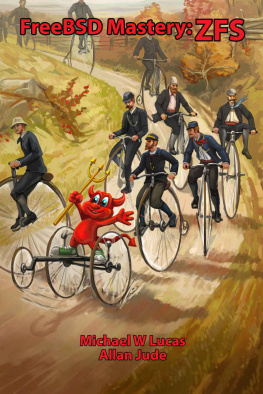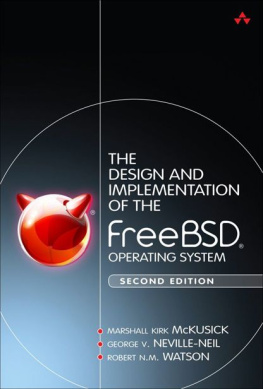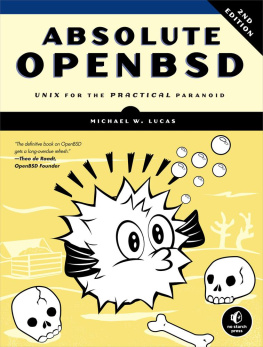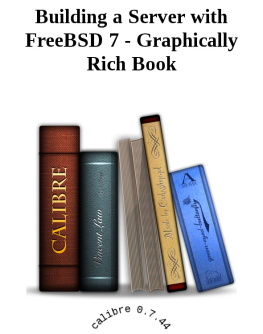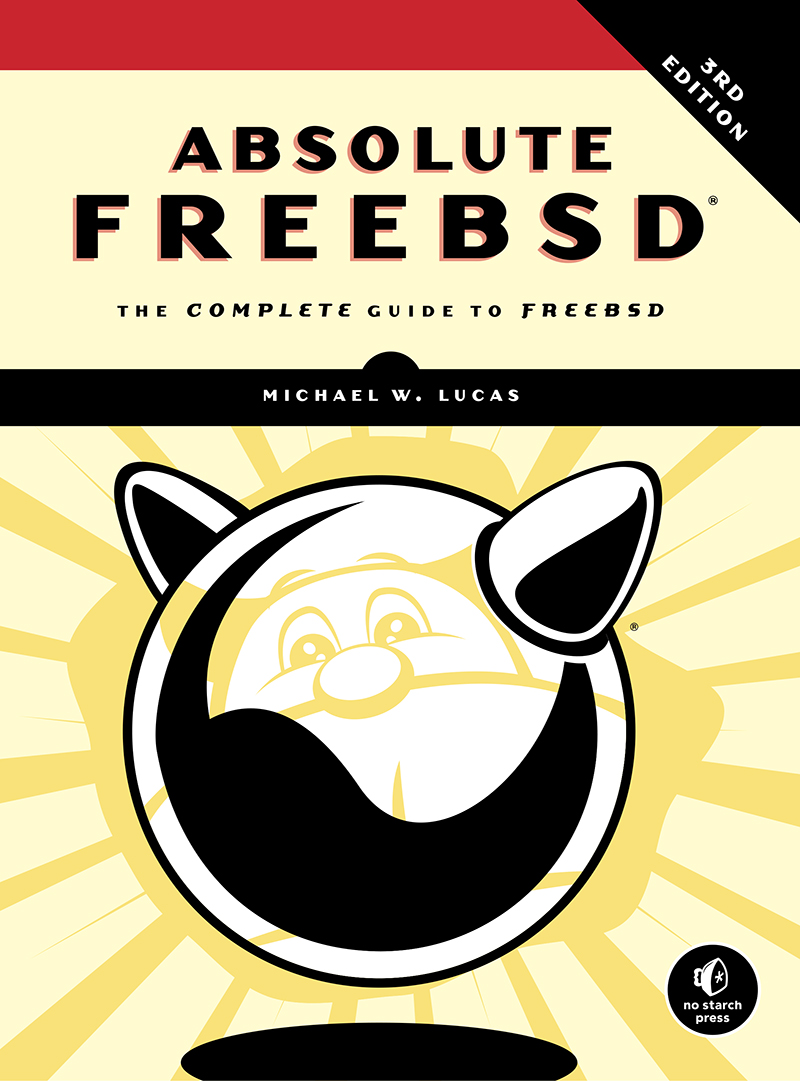Contents in Detail
PRAISE FOR ABSOLUTE FREEBSD
Even longtime users of FreeBSD may be surprised at the power and features it can bring to bear as a server platform, and Absolute BSD is an excellent guide to harnessing that power.
UNIXREVIEW.COM
... provides beautifully written tutorials and reference material to help you make the most of the strengths of this OS.
LINUXUSER & DEVELOPER MAGAZINE
... packed with a lot of information.
DAEMON NEWS
When was the last time you could physically feel yourself getting smarter while reading a book? If you are a beginning to average FreeBSD user, Absolute FreeBSD... will deliver that sensation in spades.
RICHARD BEJTLICH, TAO SECURITY
By far the best FreeBSD book I have ever owned is Absolute FreeBSD, 2nd Edition by No Starch Press.
BSD ZEALOT
Master practitioner Lucas organizes features and functions to make sense in the development environment, and so provides aid and comfort to new users, novices, and those with significant experience alike.
SCITECH BOOK NEWS
ABSOLUTE FREEBSD
3RD EDITION
The Complete Guide to FreeBSD
by Michael W. Lucas
San Francisco
ABSOLUTE FREEBSD, 3RD EDITION. Copyright 2019 by Michael W. Lucas.
All rights reserved. No part of this work may be reproduced or transmitted in any form or by any means, electronic or mechanical, including photocopying, recording, or by any information storage or retrieval system, without the prior written permission of the copyright owner and the publisher.
ISBN-10: 1-59327-892-6
ISBN-13: 978-1-59327-892-2
Publisher: William Pollock
Production Editor: Janelle Ludowise
Cover and Interior Design: Octopod Studios
Developmental Editor: William Pollock
Technical Reviewers: John Baldwin, Benno Rice, and George V. Neville-Neil
Copyeditor: Julianne Jigour
Compositor: Susan Glinert Stevens
Proofreader: James Fraleigh
Indexer: Nancy Guenther
For information on distribution, translations, or bulk sales, please contact No Starch Press, Inc. directly:
No Starch Press, Inc.
245 8th Street, San Francisco, CA 94103
phone: 1.415.863.9900;
www.nostarch.com
Library of Congress Cataloging-in-Publication Data
Lucas, Michael, 1967
Absolute FreeBSD : the complete guide to FreeBSD / Michael W. Lucas. -- 2nd ed.
p. cm.
Includes index.
ISBN-13: 978-1-59327-151-0
ISBN-10: 1-59327-151-4
1. FreeBSD. 2. UNIX (Computer file) 3. Internet service providers--Computer programs. 4. Web servers--Computer programs. 5. Client/server computing. I. Title.
QA76.76.O63L83 2007
004'.36--dc22
2007036190
No Starch Press and the No Starch Press logo are registered trademarks of No Starch Press, Inc. Other product and company names mentioned herein may be the trademarks of their respective owners. Rather than use a trademark symbol with every occurrence of a trademarked name, we are using the names only in an editorial fashion and to the benefit of the trademark owner, with no intention of infringement of the trademark.
The information in this book is distributed on an As Is basis, without warranty. While every precaution has been taken in the preparation of this work, neither the author nor No Starch Press, Inc. shall have any liability to any person or entity with respect to any loss or damage caused or alleged to be caused directly or indirectly by the information contained in it.
About the Author
After using Unix since the late 80s and spending twenty-odd years as a network and sytem administrator specializing in building and maintaining high-availability systems, Michael W. Lucas now writes about them for a living. Hes written more than 30 books, which have been translated into nine languages. His critically acclaimed titles include Absolute OpenBSD, Cisco Routers for the Desperate, and PGP & GPG, all from No Starch Press. Learn more at https://mwl.io/.
About the Technical Reviewers
John Baldwin joined the FreeBSD Project as a committer in 1999. He has worked in several areas of the system, including SMP infrastructure, the network stack, virtual memory, and device driver support. John has served on the Core and Release Engineering teams and organized several FreeBSD developer summits.
Benno Rice has been using FreeBSD since 1995 and has been a committer since 2000 when he started the PowerPC port. Since then he has worked in a variety of areas and for a number of FreeBSD-using companies. He has also served on the Core Team and presented on FreeBSD-related topics at several conferences.
George V. Neville-Neil works on networking and operating system code for fun and profit. His areas of interest are code spelunking, operating systems, networking, and time protocols. He is the co-author with Marshall Kirk McKusick and Robert N. M. Watson of The Design and Implementation of the FreeBSD Operating System (Addison-Wesley Professional, 2004).
BRIEF CONTENTS
FOREWORD
I am happy to write the foreword to Michael Lucass third edition of Absolute FreeBSD. For 15 years, Michaels Absolute series has provided the definitive guide to BSD software, filling in the whats and whys left unexplained by the detailed but largely factual documentation. And, as its name implies, it distills to its essence the enormous volume of FreeBSD documentation so that those new to the system can get up to speed quickly.
Michael is an important contributor to the FreeBSD community. He has filled many of the roles that contributors can take: answering questions, filling in pieces of missing documentation, helping to make connections in the community, and generally identifying and facilitating the things that need to be done. Michael has interacted with thousands of people: hobbyists, professional software developers, system administrators, and university professors. Much of his real-world experience and understanding of what people are trying to get done has been distilled into this book.
I have been involved with the BSD software since its beginning in 1977 as a student project of my office mate, Bill Joy, at the University of California at Berkeley. By 1980, the BSD distributions had grown from a few programs that could be added to an AT&T UNIX system to a complete system coordinated by four people who called themselves the Computer Systems Research Group (CRSG). By 1983, the socket interface had been designed and TCP/IP had been implemented underneath it, allowing a small set of trusted external contributors to log into the CSRG development machines over the ARPAnet (which later became the internet) and directly update the sources using SCCS, a very early source code control system. The CSRG staff could then use SCCS to track changes and verify them before doing distributions. This structure formed the basis for the current BSD-based projects once BSD was spun off from the university as open source in 1992.
Starting with the open-source distribution, FreeBSD initially ran on only the early PC computers. Over the past quarter century, thousands of developers have contributed to FreeBSD to make it into a powerful network operating system with state-of-the-art features that runs on all the modern computing platforms. FreeBSD powers core internet companies worldwide. From Netflix movie distribution to WhatsApp messaging, from Network Appliance and Dell/Isilon storage products to Juniper routers, from the foundation of Apples iOS to the base libraries and services of Googles Android, it is hard to throw a rock at the internet without hitting FreeBSD. However, FreeBSD is not the product of any one company, but of a large open source community: the FreeBSD Project, made up of developers, users, and countless supporters and advocates. While you can, as many people do, use FreeBSD simply as a piece of software without ever interacting with that community, you can significantly enrich your FreeBSD experience by becoming a part of that community.




